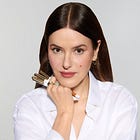Why are we still judging women for their beauty choices?
The continuing weaponisation of aesthetic treatments needs to stop.
Welcome to Glow Notes. A newsletter that’s equal parts skincare wisdom and a peek inside everything new and noteworthy in the beauty world, written by me, Simone Gannon - an aesthetic practitioner, skincare educator, and beauty journalist of over 15 years.
Here, you’ll find a mix of practical skincare advice, interviews with beauty founders, expert how-tos, deep dives into products, treatments, and the weird stuff that works.
If you read and enjoy this piece, please hit the heart button and consider subscribing.
Kris Jenner had a facelift. This is not exactly breaking news, but the continuing discourse around it has been predictably exhausting. The images were shared widely. Reactions ranged from awe to disapproval, but here’s a particular moment that stood out to me: when looking at the before-and-after with a friend, her immediate response wasn’t curiosity, or even indifference. It was disgust. Not at the (arguably remarkable) results - or even, at the possibility of doing something similar herself down the road, but at the fact that Jenner had done it at all.
Then, more recently, I overheard an acquaintance declare that she ‘doesn’t believe’ in aesthetic treatments like Botox or fillers. Not that it’s not for her. She doesn’t believe in it, as though it’s a moral failing, not a personal choice.

Another acquaintance recently shared a video on Instagram, expressing frustration with people who feel entitled to judge others’ personal aesthetic choices. Most of the comments were in agreement, supporting her view, but one stood out by suggesting that some people take these choices too far. Which highlights the problem - the idea that there is a line to be drawn. But who gets to decide where that line is (or that there should be one at all?).
Of course these responses are not uncommon, but they are revealing. Judging someone for their appearance is one thing - and it's never a good one - but judging them for the choices they make to feel better in their own skin is something else entirely. And it’s something we urgently need to stop doing.
Criticism of aesthetic treatments is often cloaked in the language of concern - for health, for authenticity, and to fit in with that old ‘letting women age naturally’ narrative. But beneath it, really, is something murkier: discomfort, competitiveness, and a desire to position oneself as somehow more ‘real’ or ‘natural’ or grounded.
Let’s be honest. The beauty industry, like it or loathe it, is a multi-billion euro economy. It doesn’t just sell products or procedures, it offers people a sense of control, identity, and sometimes dignity, particularly during difficult times. And it’s not going anywhere any time soon, so why is there still so much hypocrisy around the choices people make?
If Botox is seen as ‘too far,’ then why is hair dye widely accepted? What about gel manicures? Or makeup? If someone uses microneedling to smooth their acne scars, is that vain? What about someone who shaves their legs?
The truth is, we’re all participating in beauty culture, some more visibly than others - and the idea that one method is ‘virtuous’ while another is ‘shallow’ really says more about our own biases than it does about the actual treatments.
There is, too, a particular cruelty in how this conversation plays out among women. We are expected to look youthful, glowing, put together - but without appearing to have tried. The beauty ideal is not just unattainable, it’s a trap. If you don’t meet it, you’re invisible. And if you do, you’re mocked or deemed ‘less than’.
There is also an emerging trend of demanding disclosure. A skin doctor I follow on Instagram recently shared a message she’d received from a follower: ‘If I’m booking an appointment with you, I want to know what work you’ve had done’. Imagine that - going to a medical professional and insisting on a full breakdown of their personal beauty treatments as some kind of proof of credibility. Make it make sense.
Ultimately, what someone chooses to do (or not do) to their face is nobody’s business but theirs. We don’t know what their appearance means to them or what it's tied to - because it’s not ours. Sometimes it’s about change. Sometimes it’s about control. Sometimes, it’s just about wanting to look in the mirror and feel a bit more like yourself (and sometimes, I’d imagine, it’s about being Kris Jenner and having your face dissected by strangers for the millionth time).
Maybe it’s time to move past unsolicited opinions, sanctimonious takes and casual cruelty. Because beauty, in all its forms, isn’t going anywhere. But perhaps the judgment should.
Want to read more?







